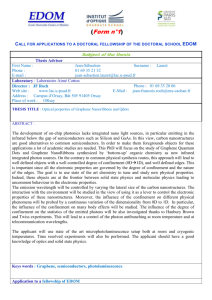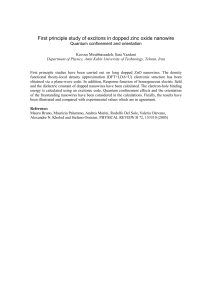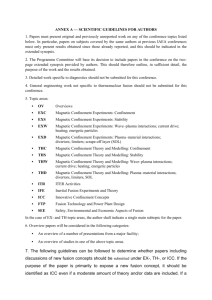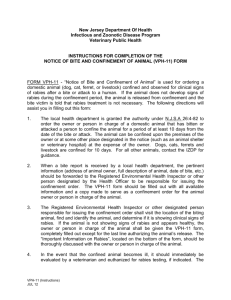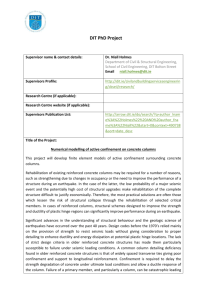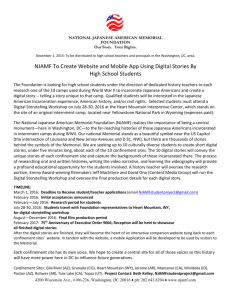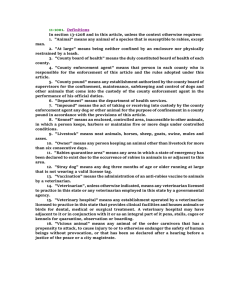Confinement of any domestice dog-cat-fettet
advertisement
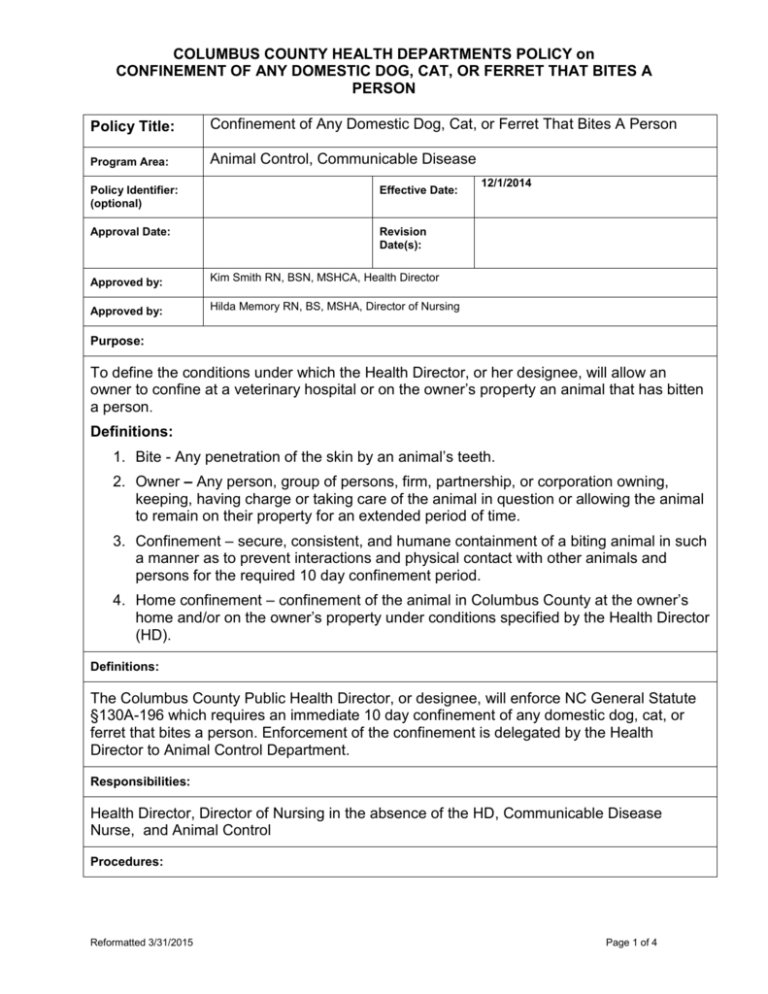
COLUMBUS COUNTY HEALTH DEPARTMENTS POLICY on CONFINEMENT OF ANY DOMESTIC DOG, CAT, OR FERRET THAT BITES A PERSON Policy Title: Confinement of Any Domestic Dog, Cat, or Ferret That Bites A Person Program Area: Animal Control, Communicable Disease Policy Identifier: (optional) Effective Date: Approval Date: Revision Date(s): Approved by: Kim Smith RN, BSN, MSHCA, Health Director Approved by: Hilda Memory RN, BS, MSHA, Director of Nursing 12/1/2014 Purpose: To define the conditions under which the Health Director, or her designee, will allow an owner to confine at a veterinary hospital or on the owner’s property an animal that has bitten a person. Definitions: 1. Bite - Any penetration of the skin by an animal’s teeth. 2. Owner – Any person, group of persons, firm, partnership, or corporation owning, keeping, having charge or taking care of the animal in question or allowing the animal to remain on their property for an extended period of time. 3. Confinement – secure, consistent, and humane containment of a biting animal in such a manner as to prevent interactions and physical contact with other animals and persons for the required 10 day confinement period. 4. Home confinement – confinement of the animal in Columbus County at the owner’s home and/or on the owner’s property under conditions specified by the Health Director (HD). Definitions: The Columbus County Public Health Director, or designee, will enforce NC General Statute §130A-196 which requires an immediate 10 day confinement of any domestic dog, cat, or ferret that bites a person. Enforcement of the confinement is delegated by the Health Director to Animal Control Department. Responsibilities: Health Director, Director of Nursing in the absence of the HD, Communicable Disease Nurse, and Animal Control Procedures: Reformatted 3/31/2015 Page 1 of 4 COLUMBUS COUNTY HEALTH DEPARTMENTS POLICY on CONFINEMENT OF ANY DOMESTIC DOG, CAT, OR FERRET THAT BITES A PERSON 1. Animal Control is responsible for investigating all incidents of bites of a person by a domestic dog, cat, or ferret. 2. Animal Control will notify the Columbus County Department of Public Health of all domestic animal bites that involve a potential human exposure to rabies by providing a copy of the Investigation Report of the incident. 3. Columbus county Health Department will review details of the incident including the narrative summary, actions of the animal preceding the bite (noting if the bite was provoked or non-provoked), description of the animal’s behavior and health, vaccination status of the animal, name and address of the victim, and name and address of the owner (if known). 4. Columbus County Health Department will confirm with Columbus County Animal Shelter that the animal is currently confined at the shelter* before consideration of any request from the owner for home confinement or confinement at a veterinary hospital. * If an employee of a veterinary hospital is bitten while caring for an animal, the animal may remain at the veterinary hospital for the course of the confinement period (with agreement from both the owner and veterinarian/veterinary hospital). 5. The owner may request confinement of the animal at a veterinary hospital/facility by submitting a written request to the Health Director, or her designee. The request must include written agreement from the veterinary hospital/facility to confine the animal. The agreement must be on the letterhead of the veterinary hospital/facility and clearly indicate the start and end dates of the confinement period, willingness of the veterinary hospital/facility to abide by all conditions of the confinement authorization as specified by the Health Director, and be signed by a licensed veterinarian on staff at the veterinary hospital. 6. The owner may request home confinement of the animal by making a written request to the Health Director. The Health Director, or her designee, upon receipt of a written request by the owner, may allow home confinement of the biting animal under the following conditions: a. Biting animal is normal and healthy at the onset of confinement* b. Biting animal is currently vaccinated against rabies (need proof of vaccination) c. Bite was provoked d. There is no history of bite incidents with the animal in question e. Bite victim was owner, family member or someone who regularly resides in the home, an employee at a veterinary hospital/facility, an employee at a Reformatted 3/31/2015 Page 2 of 4 COLUMBUS COUNTY HEALTH DEPARTMENTS POLICY on CONFINEMENT OF ANY DOMESTIC DOG, CAT, OR FERRET THAT BITES A PERSON f. g. h. i. j. pet grooming facility, a pet sitter, or a pet trainer providing a professional service. Owner agrees to confine/secure the animal in an enclosure or to contain the animal in such a way as to restrict direct physical contact with other animals or people other than the primary caretaker, whether inside or outside, at all times. The animal must be secured in a humane manner The animal will not be vaccinated or given new medications during the confinement period Owner agrees to monitor the animal daily for changes in behavior or health, to document observations daily on the monitoring form provided by Columbus County Health Department, and to notify the Columbus County Health Department immediately should any health or behavioral changes occur or if the animal dies. Owner understands that Animal Control will make unannounced visits during the confinement period to evaluate the animal’s health and verify compliance with all conditions of home confinement. *If the animal is ill at the onset of the confinement period or becomes ill during confinement, a veterinarian should be contacted immediately to examine the animal for signs consistent with rabies. If an acute or chronic disease process other than rabies is diagnosed that explains the clinical signs, then the animal should be confined at a veterinary hospital. Any animal that dies during the confinement for any reason shall be submitted by Animal Services to the NC State Laboratory of Public Health for testing. 7. Home confinement of the biting animal may also be requested if the animal is declared, in writing, by a licensed veterinarian to be too ill, infirm, or medically unstable, to survive a 10 day confinement period at the Columbus County Animal shelter or at a veterinary hospital. 8. If an animal is approved for home confinement, Animal Control will make at least one unannounced visit to the home during the 10 day confinement period to ensure compliance with all conditions of home confinement. 9. If any of the above conditions of home confinement are not met, or if there is evidence of non-compliance by the owner, Animal Control will immediately notify the Health Director. At that time, home confinement will be revoked, and the animal will be confined for the remainder of the confinement period at the Columbus County Animal Control Shelter at the expense of the owner and under the following conditions: a. The owner may visit the animal but not remove the animal from the shelter Reformatted 3/31/2015 Page 3 of 4 COLUMBUS COUNTY HEALTH DEPARTMENTS POLICY on CONFINEMENT OF ANY DOMESTIC DOG, CAT, OR FERRET THAT BITES A PERSON during the confinement period. b. The animal will be isolated from other animals and not have direct physical contact with animals or with people, including the owner c. The animal will be monitored daily; Columbus County Health Department will be contacted immediately if any changes in the animal’s behavior or health occur or if the animal dies. 10. The owner will be responsible for any and all costs related to confinement, regardless of where the confinement occurs. 11. An owner who fails to confine the animal as required by the Health Director will be guilty of a Class 2 misdemeanor. 12. Consultation between Animal Control and the Health Director will take place for situations not addressed in this policy. Laws and Rules: NC General Statutes §130A-196 and 130A-199 Reference(s): 1. Compendium of Animal Rabies Prevention and Control, National Association of State Public Health Veterinarians, 2011. 2. Personal communication, NC DHHS, NC Division of Public Health, Veterinary Public Health, November 16, 2012; November 20, 2012. 3. Centers for Disease Control and Prevention, Rabies, http://www.cdc.gov/rabies Reformatted 3/31/2015 Page 4 of 4
